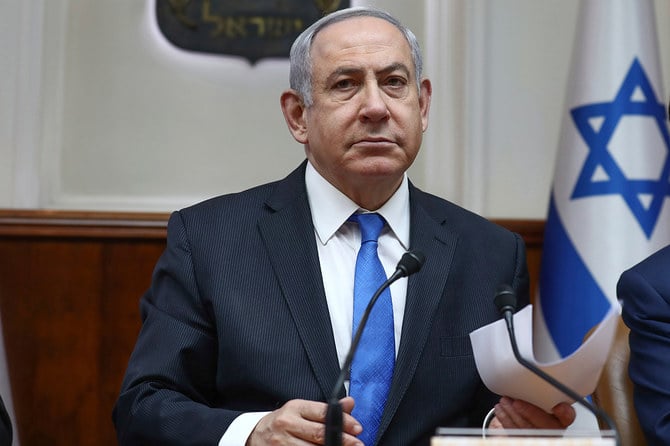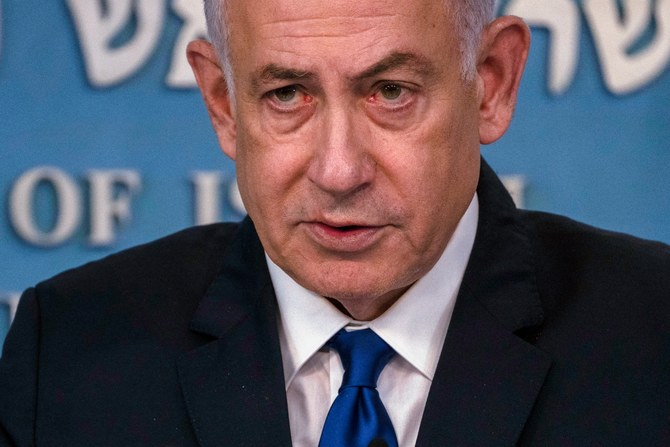
Benjamin Netanyahu’s wish for a return to the prime minister’s office in Israel has been granted, and with it the possibility of halting his corruption trial — which had become the driving force behind his moves to regain power.
Politically, however, he is weaker than he ever has been, because to regain the premiership he was forced to place himself at the mercy of the far right and the ultra-Orthodox, who will blackmail him to the point that should this government manage to complete a full term, Israel will be unrecognizable by the end of it — and much the worse.
Those who support the newly formed government accuse its critics of not respecting democracy and the legitimate constitutional process that led to the swearing-in of this sixth Netanyahu government.
Nothing could be further from the truth. The early signs — emerging from initial legislation, coalition agreements and the behavior of ministers — are that members of the government are setting about bringing an end to any semblance of Israel as a liberal democracy or one that even remotely respects international law.
They will do this by assaulting the justice system, marginalizing minorities and deliberately seeking to provoke confrontation with the Palestinians, even at the cost of endangering the peace and normalization agreements Israel has signed with other countries in the region and its relations with the wider international community.
In a democracy, change of government is healthy and necessary but this new coalition seeks to erode the very foundations of democracy. Acts such as changing laws within weeks of being elected for no reason other than to satisfy coalition partners — including legislation that allows those convicted of offenses but not given a custodial sentence to serve in government — or changing the responsibilities of specific ministers are crudely undermining the democratic process and leaving the notion of good governance in tatters.
This is a government the prime minister of which is facing a trial for corruption, whose interior and health minister has been convicted of corruption and tax evasion, and whose National Security Minister Itamar Ben-Gvir, ironically now in charge of the police, was convicted of incitement to racism and supporting a terrorist organization. To oppose such a government, therefore, is hardly a result of being a sore loser of an election, it is rather an elementary act of defending decent standards in public life.
The far right in Israel, unlike similar groupings in Europe for example, is religious and exploits religious symbolism to exclude others. It might be the case that in Judaism the lines between national identity and religion are blurred but, nevertheless, Israel’s 37th government, which was sworn in last week, has already announced a guideline stating: “The Jewish people have an exclusive and inalienable right to all parts of the Land of Israel. The government will promote and develop the settlement of all parts of the Land of Israel — in Galilee, the Negev, the Golan and Judea and Samaria.”
It remains to be seen whether this coalition government can complete its term, given that friction between its members is inevitable.
Yossi Mekelberg
Where does this leave the approximately 7 million Palestinians who live inside Israel, in the occupied West Bank and in the blockaded Gaza Strip, in terms of their status? Treating Palestinians as second-class citizens is not an attitude created by Israel’s new government. To varying degrees it has been developed over time by a mixture of formal policies and habitual practices, all of which culminated in the despicable Nation-State Law of 2018.
However, the current government is wearing it as a badge of honor with no shame and no qualms. Adopting as an article of faith the expansion of settlements in all occupied territories is a poke in the eye to the Palestinians, international law and anyone who believes in a peaceful resolution to the Palestinian-Israeli conflict.
It is only a matter of time, and a very short time at that, until the outposts in the West Bank are legalized. They have been considered illegal even by previous Israeli governments and are home to the most extremist Jewish settlers, a considerable number of whom are involved in the ongoing violent harassment of Palestinians.
Moreover, the master provocateur Ben-Gvir, barely a week in office, has already carried out the single most inflammatory act with regard to relations with the Palestinians and the wider Muslim world, by visiting Al-Haram Al-Sharif/Temple Mount. He knows full well that, unlike his provocative visits in the past, this time, as the minister in charge of the police, his visit carries a different weight altogether.
This comes in addition to the responsibility for Israel’s Civil Administration of the West Bank being handed to the leader of the Religious Zionist party, Bezalel Smotrich, another political pyromaniac who has a long history of expressing extreme, racist, anti-Arab views and supports the full annexation of the West Bank without granting Palestinians citizenship rights. In other words, he intends to make an apartheid regime in the West Bank official Israeli policy.
In a week when the UN General Assembly asked the organization’s highest court, the International Court of Justice, to give its opinion on the legal consequences of Israel’s occupation of Palestinian territories, the new coalition’s agreements and the personnel involved in the new Israeli government render the response to this query self-evident.
In the coming weeks and months, Israelis, and those who observe Israel with a mixture of interest and concern, will have to decide how to respond to an avalanche of legislation and policies that would undermine the justice system, including the role of the High Court of Justice and the attorney general, harming both the separation of powers and the mechanism of checks and balances designed to guarantee the democratic system.
Racism, misogyny and homophobia are part and parcel of this government and characterize the religious parties within it. And all of this with the consent of Netanyahu and his Likud party.
It remains to be seen whether this coalition government can complete its term, given that friction between its members is inevitable. It also puts to the test Israel’s neighbors in the region, especially those with whom it has signed peace and normalization agreements and who will be inescapably affected if relations between Israel and the Palestinians deteriorate further.
It is also high noon for the US and the EU, among others in the international community, who have, wrongly and damagingly, given Israel an easy ride over its treatment of the Palestinians.
But most of all, it puts the Israeli people themselves to the test and asks them whether they still aspire to live in a genuine democratic state or in a full-blown apartheid state led by the most zealous of the country’s religious fundamentalists.
Such existential questions are going to determine the character, and even the survival, of Israel in the coming years and there is no time left to merely flinch at them.
Yossi Mekelberg is professor of international relations and an associate fellow of the MENA Program at Chatham House. He is a regular contributor to the international written and electronic media. Twitter: @YMekelberg











